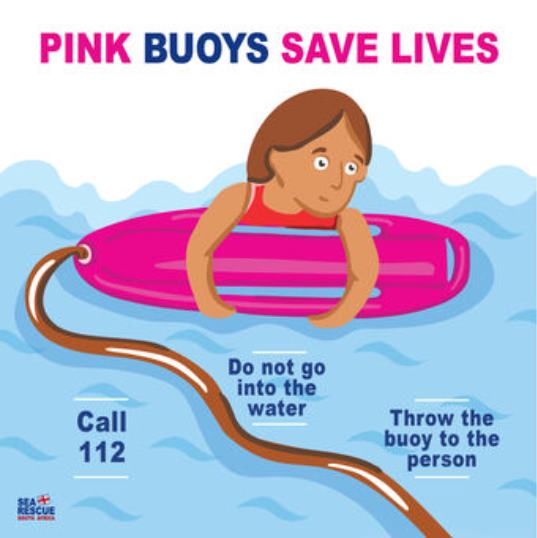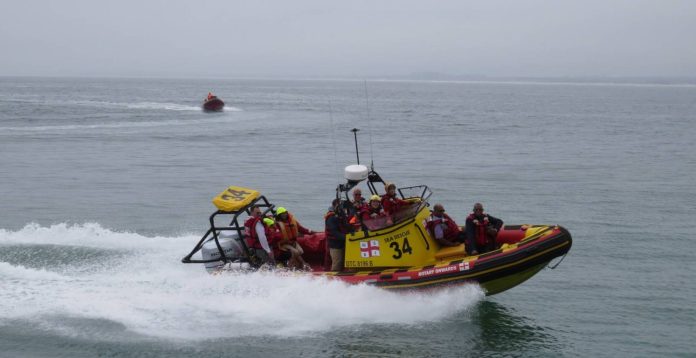It is summer holiday and time for everybody to flock to the sea again. Here is an article by the NSRI on safety while enjoying the sea.
The NSRI wishes everyone a safe summer holiday and we urge the public to adopt a water safety mindset around coastal and inland waters. Our rule number one, for a safe experience at the beach, is to choose a beach that has lifeguards on duty and to swim between their flags. If you do that, you don’t need to worry about rip currents, or suddenly getting out of your depth.
Putting an arm in the air and waving for help will get a rapid response from the lifeguards on duty. Unfortunately, for various reasons, people regularly swim where there are no lifeguards on duty. This may be on a beach before or after the lifeguard’s duty for the day or at a beach that does not have Lifeguards. This is when things can go wrong. In a typical scenario Sea Rescue gets an emergency call for a swimmer in difficulty and, when we get there, we find two or more people in danger of drowning. Tragically, sometimes we are not able to get there in time and someone drowns. Often the person who does not survive is the kind person who went into the water to try and help a person who was in difficulty.
 Because this happens so frequently, Sea Rescue launched our Pink Rescue Buoy project in November 2017. These bright Pink Rescue Buoys are hung on strategically placed signs and we hope that they will remind people to take care when entering water – and not to swim if lifeguards are not on duty at that stretch of the beach. If there is an incident and someone needs help these buoys can be thrown to the person in trouble in the water, providing them with emergency flotation. There are clear graphics on the sign which explain how to use the Rescue Buoy. And most importantly, the emergency number for the closest Sea Rescue station is printed on the sign. If anyone decides, against advice, to enter the water to try to rescue someone in trouble first call Sea Rescue and then use the Pink Rescue Buoy to provide flotation for that good Samaritan as well as for the casualty.
Because this happens so frequently, Sea Rescue launched our Pink Rescue Buoy project in November 2017. These bright Pink Rescue Buoys are hung on strategically placed signs and we hope that they will remind people to take care when entering water – and not to swim if lifeguards are not on duty at that stretch of the beach. If there is an incident and someone needs help these buoys can be thrown to the person in trouble in the water, providing them with emergency flotation. There are clear graphics on the sign which explain how to use the Rescue Buoy. And most importantly, the emergency number for the closest Sea Rescue station is printed on the sign. If anyone decides, against advice, to enter the water to try to rescue someone in trouble first call Sea Rescue and then use the Pink Rescue Buoy to provide flotation for that good Samaritan as well as for the casualty.
Have a plan in place in the event of an emergency to prevent panic:
- Make sure you have emergency numbers that you may need saved in your cell phone. Dial 112 from any cell phone in any emergency. Or simply Google Sea Rescue or NSRI for the closest Sea Rescue station’s telephone number.
- Check the wind, weather and tides before going to the beach, fishing or boating.
- Tell someone where you are going and when you are due back, and make sure that they know your route, your intentions and who to call if you are overdue.
- When climbing on rocks or fishing from rocks – never ever turn your back on the sea and we strongly advise rock anglers to wear a life-jacket and know when spring high tide is.
- If you are paddling or if you are on a boat, before you launch, download and always use NSRI’s free SafeTrx app – http://www.nsri.org.za/safetrx
Here are some safety tips to bear in mind this summer:
- Swim at beaches where and when lifeguards are on duty.Lifeguards are on duty at selected beaches between 10am and 6pm on weekends and during the week during summer school holidays. Listen to their advice and talk to them about safety on the beach that you are visiting. They are the experts on that beach. If lifeguards are not on duty do not swim.
- Swim between the lifeguard’s flags.Teach children that if they swim between the lifeguards flags the lifeguards will be watching them and can help if there is a problem. Lifeguards watch swimmers very carefully between the flags – just wave an arm if you need help.
- Don’t drink alcohol and then swim.
- Don’t swim alone. Always swim with a buddy.If you are with a buddy while swimming there is someone who can call for help if you need it and you can’t wave to the lifeguards or call for help yourself.
- Adult supervision and barriers to water are vital.Adults who are supervising children in or near water must be able to swim. This is vital if it is at a water body that does not have lifeguards on duty. It is extremely dangerous to get into the water to rescue someone so rather throw something that floats to the person in difficulty and call for help (112 from a cell phone and check for the nearest Sea Rescue station telephone number before you visit a beach – put that number into your cell phone). Children should not be able to get through or over barriers such as pool fences to water. Only use child safe pool fences and child safe pool covers or nets.
- Know how to survive rip currents.If you swim between the lifeguard flags they will make sure that you are safe and well away from rip currents. If for some reason this is not possible do not swim. Educate yourself about rip currents, there is plenty of educational material here http://www.nsri.org.za/2017/01/beware-of-rip-currents/ including videos of what rip currents look like.
- Don’t attempt a rescue yourself. Call a lifeguard or the NSRI by dialling 112 from your cell phone for help. If you see someone in difficulty call a lifeguard at once or dial the nearest Sea Rescue station from your cell phone. You should put this number into your phone before you go to the beach – get the emergency numbers for NSRI here http://www.nsri.org.za/emergency-numbers/ or you can Google for the closest NSRI station emergency number. 112 is a good emergency number – for any emergency – to dial from your cell phone. After calling for help try and throw something that floats to the person in difficulty. A ball, a foam surf board and so on.
- Watch children who are using floating objects, toys or tire tubes at the beach or on dams very carefully. Never use these if the wind may blow them away from the shallow water.You can very quickly get blown away from the shore and as much fun as tubes and Styrofoam are it is easy to fall off them. If a child can’t swim and falls off in deep water they will drown.
- Do not be distracted by your cell phone or social media.While you are looking after children in or near water you need to focus on them and nothing else. Adults who are supervising children should not be distracted or use their cell phone. It is not possible to concentrate on children in the water and be on your phone at the same time.
- Learn how to do CPR. Have the emergency numbers saved in your phone.

The original article can be found here.



